Food and freedom
Bernard Dixon
Whenever water fluoridation hits the headlines—most recently with the publication of last month's Royal College of Physicians report—we hear much about 'mass medication' and freedom of choice. So far passing comparatively unnoticed, however, is a lobby of increasing persuasion that would give scientists considerable power to determine what we do and do not eat. Its battle cry is not simply the reasonable prohibition of hazardous substances from food. It is an altogether more sweeping proposal to prevent us having too much of such ordinary foods as fats, protein, and carbohydrate that may (just may) be considered undesirable.
The thinking behind this movement, whose effects can already be discerned in several countries, is admirably summarised in an article by Colin Blythe published this week in Food Policy (February, p91). In the past, Blythe argues, nutrition experts were concerned largely with seeing that people ate enough of the right foods. As well as initiating the fortification of cereals and other foods with vitamins, for example, to ensure an adequate daily intake, they were responsible for publicity and health education designed to tell us all about the need to eat enough milk, meat and other foods to provide the protein required for good health.
Now, the argument runs, we consume far too much of these goodies. The problem is to stop us from doing so, to reduce our intake of food, and limit our freedom of choice. The reason for so doing, as argued by Blythe, is not to help the world's hungry by ceasing guzzling ourselves. It is to keep us well. And the methods advocated for this effort are not only education and persuasion, but also 'appropriate production and pricing policies'. People cannot be compelled to change their eating habits, he says, so 'nutritional precepts may be strongly reinforced by a judicious food-pricing policy'. In other words, both producers and eaters are to be discouraged financially away from highly nutritious foods, too great an intake of which is deemed unsatisfactory by government scientists.
Lest this line of thinking appear no more than naive academic speculation, let me quote from an official document on the future of Norwegian food policy: 'Taste does not give any reliable guide to what is nutritionally—or as far as health is concerned—correct and there is therefore a clear need to protect individuals from the damaging things they bring upon themselves on account of their lack of guidance or self-protective mechanism. This can be best brought about by so arranging that the foods on offer—and the production of both essential and "indulgence" foods— correspond to nutritional and health needs.'
Of course, we know and have known for centuries that blatant over-eating is associated with an increased risk of heart disease. That fact, and ideas about which foods may be most blameworthy, are broadcast and printed continually in the media. Health education does work. But for the state to go further would be politically naive and scientifically unsound.
The wrongheadedness of such ideas is highlighted by another example cited by Colin Blythe: tooth decay. Better understood than coronary heart disease, dental caries would no doubt be a tempting target for a nutritional dictator. But could any democratic government ever try to put sweets beyond the range of children ?


































 Previous page
Previous page